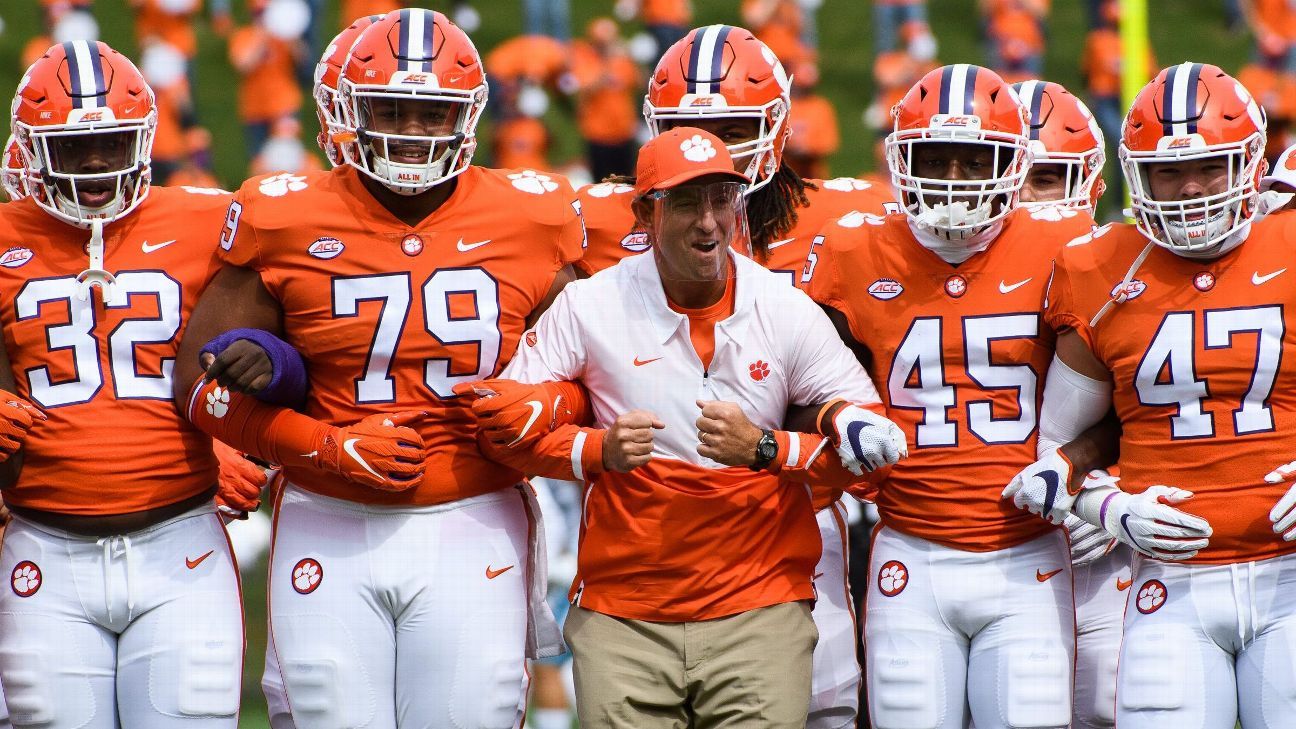Clemson coach Dabo Swinney reiterated comments in support of the Black Lives Matter movement and his own players’ push toward social justice reforms Tuesday, but he noted that he was uncomfortable with messages on uniforms and with the politicalization of the efforts.
Swinney again said Tuesday that “Black lives more than matter,” but said he considered himself a traditionalist on uniforms and didn’t like the idea of name plates and patches on jerseys and helmets, which have been allowed by programs around the country this season in the wake of widespread protests of police brutality and racial injustice.
“It’s not that I’m not for the messages, but I’m a very traditional guy,” Swinney said. “I came from Alabama. It’s not anything to do with the messages, I’ve always just not messed with uniforms. But that’s all changed this year.”
Swinney said he has encouraged his players to develop their own ways to show support for social justice reforms, including uniform changes, and has instituted only one rule: Everyone in the locker room must agree with it. Swinney said that has led to several positive conversations and created better communication between players, as well as “sending them back to the drawing board” several times.
Clemson quarterback Trevor Lawrence, running back Darien Rencher, receiver Cornell Powell and linebacker Mike Jones Jr. helped organize a protest march this summer, and they’re working on several other items they said will show up throughout the season to bring awareness to the issues. Swinney spoke at the protest as well.
Swinney’s comments came after a caller to his Monday night radio show pressed the Clemson coach on his support of Black Lives Matter.
The caller, identifying himself as a law enforcement officer, said Black Lives Matter was “built predominately on hate and that is for all law enforcement … I just wish, and the love and equality stickers and all of that, that is great, I just wish you guys would rethink the BLM stickers and kind of look deep into what that group is and think about the rest of your fan base, who are law-abiding Christian-Americans.”
Swinney responded that his brother worked as a police officer, and that he supported law enforcement, but said he wanted his players to utilize their free speech rights and stand up for issues important to them.
“For our football team, this is America and everybody has the right to free speech,” Swinney told the caller. “I don’t judge somebody because they don’t think the way I think. I think that is one of the issues that we have. We don’t have any tolerance or respect for differences of opinion, different views anymore. There is no one around here that supports a senseless death of any kind; racism, anything that is against the police or police brutality. Nobody supports those things. Now sometimes, some individuals have their thoughts, but I think that is what makes our team great.
“These guys have been challenged with lots of different things. They are figuring things out. They are young people and they have to make their own decisions.”
Asked Tuesday to clarify his stance on Black Lives Matter as a movement, Swinney was careful to differentiate between the message and the organization.
“I’m on board with a lot of the messages, but I’m not on board with political organizations,” Swinney said. “That’s a different question. I’m apolitical. To me, that’s divisive. I’ve voted Democrat, Republican, independent, I’ve written in people when I didn’t like anyone running. I’m apolitical when it comes to organizations. I don’t support organizations, I support common-sense causes.”
Lawrence and Rencher have been at the forefront of several player-led movements this summer, including pushing the NCAA to allow the season to progress amid the coronavirus pandemic and creating a list of goals to enact social justice reforms. Both players have reiterated that they’ve approached each issue by finding common ground with others and working from there, a policy Swinney said he has recommended.
On his radio show Monday, Swinney said he felt it was important to listen to alternative viewpoints, and encouraged his players to do so, while also offering their own opinions.
“Now whether I agree with certain things, it does not matter,” Swinney said. “This is, again, them learning and growing and figuring things out. Young people grow. Some people change. Some people think something at 20 and think something different at 30. We have all been there. But I can tell you this, we have a united football team that definitely does not all think the same. They do not all think the same and they do not agree on everything and this and that, but they love each other. I think that is a great example for all of us.”
Swinney said that he drew a distinction between organizations that take a political tone toward racial justice and the common-sense messaging that Black lives matter, adding on his radio show that, “as far as people supporting hate or bad things against cops, that is crazy. Nobody supports that.”
He said Tuesday that the same approach is true for Black Lives Matter.
“Anyone who doesn’t believe Black lives matter,” Swinney said, “you should look into your soul.”
